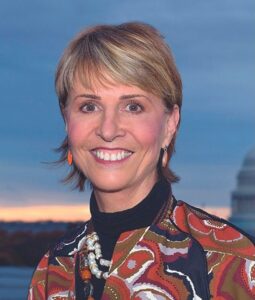 2 min read April 2022 — Texas Woman’s University is the first and only public university system—Denton, Dallas, Houston—in the nation with a woman-focused mission. Carine Feyten, chancellor and president of the university, spoke with Invest: to discuss the economic impact of the institution on the region, achievements over the last few years and her outlook for the future.
2 min read April 2022 — Texas Woman’s University is the first and only public university system—Denton, Dallas, Houston—in the nation with a woman-focused mission. Carine Feyten, chancellor and president of the university, spoke with Invest: to discuss the economic impact of the institution on the region, achievements over the last few years and her outlook for the future.
How do you measure the economic impact of your institution in the region?
When you look at the university’s economic impact, it’s a lot bigger than people would imagine. We have a $1.8 billion regional impact on the state of Texas primarily driven by our alumni who stay to work in Texas after graduation. And, because of our mission, most of these alumni are women, making a difference in the boardroom, in hospitals and health practices across the state, in schools, in laboratories and at home.
Additionally, more than half of Texas Woman’s students are first-generation, and our diversity reflects that of the state. In fact, we are tied for fourth in the nation for diversity, according to U.S. News & World Report, and designated a Hispanic-Serving Institution. We offer opportunities that will boost the economy of Texas today and in the future because we focus on graduating thriving citizens who have a strong sense of community, health, and purpose.
What were some of your achievements over the last two years?
We have reached what I like to call an inflection point for the university. In the last session, the legislature established the Texas Woman’s University System. We are now the seventh university system in the state and the first in the nation with a focus on women. This is a huge point of pride for us. As a system, we can better support our campuses in Denton, Dallas, and Houston so they can serve those communities with greater intentionality.
During this last legislative session, we were also very fortunate to receive $100 million to build a new health science center in Denton. This too will be a game-changer and bring together all of our health disciplines—physical therapy, occupational therapy, nutrition and nursing—with an interprofessional approach.
The new health science center will focus on rural health, which is a huge area of need in Texas.
What is your institution doing in terms of scientific research?
Texas Woman’s is known for applied research. I call it “research that matters.” One of our molecular biology students is working on the area of viruses and infectious diseases and their relationship to breast cancer. It’s powerful research. We have a couple of biology faculty working with plants that could be used instead of opioids for non-addictive pain management. And, we have another group looking at PTSD in women, something that hasn’t been studied in women as closely as it has been in men.
Involving students in our research is especially important at Texas Woman’s, where we promote learning by doing. NASA has a design competition they hold every year for university students, primarily in engineering, who work to find solutions for particular challenges for astronauts in space. If it’s successful, NASA may take that solution, test it out and carry it further. Prior to 2018, we had not participated in this competition because we don’t have a college of engineering.
Four years ago, our kinesiology program selected a group of students to participate in the competition, and they took a very different approach, as you would imagine. They looked at the health of the astronauts rather than traditional engineering problems. They noticed that during space travel, astronauts lose a lot of muscle and bone mass and return to Earth with back pain. Our team worked with our fashion and textiles department to design a garment outfitted with electrodes in the back to stimulate muscles and nerves and help prevent that bone and muscle loss. They blew away everyone at the competition and won three awards, including best overall team. Many thought this may have been beginner’s luck, but in Fall 2021, we did it again—top prize in every category but one, where our team came in second. This time the project focused on sleep disruption in astronauts. We were named the first all-women team to ever win the competition! This story shows how diverse teams with different perspectives are better at solving previously intractable problems.
What is your outlook for Texas Woman’s University for the near term and what are some of your top priorities?
One of the top priorities is expanding our portfolio of programs, especially for high-need areas such as women in science, technology, engineering and math (STEM). We want to continue building on our distinctiveness and leverage it to support women’s leadership development. This is one of the key strengths we bring to the table.
Another goal is to grow our campuses in Dallas and Houston into independent universities. This is really essential to our mission and will contribute more talent to two of the biggest metroplexes in the nation.
Finally, I strongly believe that we should serve our students with greater intentionality and make sure that we give every admitted student the best opportunity for success—and to graduate with little to no debt. This also means helping our students develop marketable skills that allow them to thrive as global citizens. Our students leave Texas Woman’s with a sense of purpose and a desire to build a better world. The key is to keep doing what we do well while looking around the corner and envisioning the future. It’s a careful but essential balancing act.
For more information, visit:
